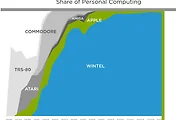많은 분석가들은 '자기 성공의 희생자'(A victim of its own success)라고 부른다. 기존 고객층을 포기하지 못하고 우물쭈물하다 새로운 시장 진출에서도 뒤져버린 매우 교육적인 케이스.
Research In Motion, whose BlackBerry phones pioneered wireless email, no longer holds the commanding heights in the smartphone market. With Android, iOS, and even Windows Phone gaining market share, the Waterloo, Ontario, company finds itself in a battle for relevancy. The past year has been especially hard on the once-innovative RIM, but it may be at a turning point. Or the beginning of the end.
Last April, Mike Lazaridis sat in a BBC studio, holding his company's future in his hands: a svelte seven-inch tablet, black, with the word "BlackBerry" emblazoned across its front. The PlayBook.
The company was Research In Motion, the Canadian firm whose BlackBerry virtually created the smartphone market. Success had come almost naturally to the company, until five years ago, when Apple released the first iPhone and upended RIM's long-held strategy of appealing primarily to email-addicted professionals. Apple expanded the market by building a smartphone not just for business people, but for the great mass of well-heeled, tech-hungry consumers. Apple's success opened the door for another large, deep-pocketed competitor: Google, with the acquisition and development of Android. The mobile landscape shifted dramatically — new players, new customers, and new alliances — and RIM made costly missteps scrambling to adjust.
출처 :
http://www.theverge.com/2012/2/21/2789676/rim-blackberry-mike-lazaridis-jim-balsillie-lost-empire
'지적재산권보호 > 글로벌' 카테고리의 다른 글
| 60초 동안에 소셜미디어에서 일어나는 일 (0) | 2012.02.28 |
|---|---|
| 애플, 특허괴물 Brandywine에게 제소 당하다. (0) | 2012.02.23 |
| 왜 모바일인가? (1) | 2012.02.22 |
| 구글, MS, 아마존이 오프라인 소매점을 연다고.. 여기서 도대체 무엇을 팔려는 걸까? (1) | 2012.02.14 |
| 애플이 드디어 종결 특허를? 삼성과의 특허전쟁에서 화려한 대미를 준비하는가. (2) | 2012.02.11 |
